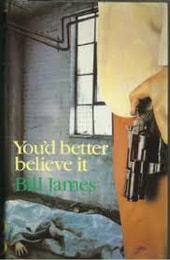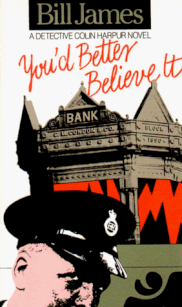
You’d Better Believe It is not consumed with politics, although complaints of neutering the actions of officers because of an over-hysterical media and inter-departmental oversight are part of Harpur’s world. The narrative has a simple and absorbing chronology: from his informants, Harpur hears a rumor and tries to learn when a group of bank robbers will attack a Lloyd’s branch. A promising young officer goes missing while searching for information, and his disappearance brings Harpur closer to the man’s attractive wife. (Harpur is married, not quite happily, with two daughters.) The robbery occurs, with casualties on both sides, and the leader of the gang gets away. In the book’s third act, people disappear, bodies pile up, and Harpur becomes increasingly obsessed with catching the criminal.
Just as Bill James’ astute and deftly drawn character psychologies should be celebrated, he shares with Nicolas Freeling a willingness to allow his procedural plots to sport the rough and unpredictable edges of reality. In Believe It’s conclusion, James takes his protagonist’s agency away from him. Although Harpur is chasing his quarry like a man possessed, he is denied the ability to end the chase on his own terms. (Others with greater power play God; the working-man detective must get out of the way and let the adults finish the game.) It is a fearless choice on the author’s part, especially for his series début, but it feels exactly right. In reality, and especially in a world where honorable and corrupt intentions commingle in the same character, there are very few moments of clean, justice-prevails closure.

There is so much cultural anthropology, captured in a restless snapshot of 1980’s British urban dissatisfaction, that You’d Better Believe It completely engaged and often surprised me in terms of story, character, setting, and drive. Obviously, it is not the perfect fit for all readers, and classic puzzle fans may want to keep with Christie and Queen. But I am excited to see such a strong start to a crime fiction series, and will soon approach James’ next title, The Lolita Man. I have heard whispers from my narks that the second book ups the ante, and is more visceral than the first. I will find out what awaits Detective Harpur and me soon.
 RSS Feed
RSS Feed